Don't fuel the fire: Never dispose of hazardous materials in your bins
Did you know that batteries are the leading cause of fires in trucks and facilities?
Australians are unknowingly causing dozens of fires each year by discarding hazardous waste incorrectly in kerbside bins putting drivers, operators and communities in danger.
Keep batteries and flammable materials out of your bins
One spark from an old battery is all it takes to set a rubbish truck or an entire facility up in flames. Spark the right sort of action in your community by disposing hazardous waste materials responsibly.
Batteries from smartphones, laptops and other electronics are a growing cause of truck, facility and landfill fires. These can ignite from friction and heat, starting a fire that spreads to other flammable material nearby such as cardboard. Keep batteries and other household hazardous waste out of all your kerbside bins.
Safe disposal of household hazardous waste
Remove batteries from their devices if you’re not using them. Store old, used and empty batteries in a cool and dry space away from sunlight pending disposal. Single-use batteries can be recycled through specific retail outlets. Computer and phone batteries can be recycled as e-waste. Vehicle batteries can be recycled at select retail outlets and garages. Check with your local council to see if they offer a kerbside recycling service.
Most councils also offer a Household Hazardous Waste drop-off event or permanent drop-off points.
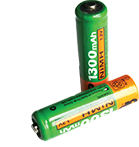 Batteries
Batteries
When batteries are not properly disposed of, the casing disintegrates and the toxic chemicals inside leach into the surrounding environment. This toxic material can contaminate the soil and groundwater affecting the health of humans, wildlife and the environment.
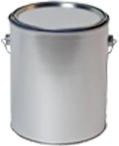 Paint
Paint
Paint is considered hazardous due to its flammability. When disposed of incorrectly, it exposes people and animals to risk of injury in a fire and cause skin, lung and eye problems through the paint fumes. If the paint contains lead, it increases the risk of lead poisoning if ingested.
 E-waste
E-waste
Chemicals in e-waste such as mercury, cadmium, lithium and lead are a safety hazard to people, animals and the environment. In addition to contaminating soil, these toxic materials can pollute the air and leach into waterways.
 Flares
Flares
Most flares have a use-by date of three years and must be replaced before the expiry date. Damaged or expired flares are a fire hazard if not stored or disposed of correctly.
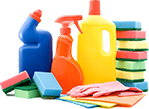 Hazardous chemicals
Hazardous chemicals
Household hazardous chemicals such as chlorine and bleach are highly flammable, corrosive, or explosive and should never be thrown into just any bin.
How do I dispose of household hazardous waste?
Many councils across Australia regularly organise free household hazardous waste drop off events in addition to permanent drop off sites at community recycling centres and selected resource recovery facilities. Check with your local council on the availability of local drop-off events, permanent disposal sites, and national or state collection programs.
Typically, each container of material dropped off should not exceed 20kgs or litres. Any more would require a dedicated chemical collection and disposal service. Businesses should also contact a hazardous waste disposal service directly.
In view of the current public health situation, some household chemical disposal services across Australia may be affected. Check with your local councils by calling them or looking up information online to find out the latest household waste disposal guidelines. If you’re unable to immediately dispose of household chemicals, make sure you safely store them until you can.
National programs
- Paintback
Collects your unwanted paint and packaging to be treated or recycled, not sent to landfill. - Techcollect
TechCollect operates under the National Television and Computer Recycling Scheme (NTCRS), and helps you recycle unwanted e-waste safely and responsibly. - DrumMuster and ChemClear DrumMUSTER is the national program provides chemical users with a defined route to safely dispose of used chemical containers.
- MobileMuster
MobileMuster accepts all brands and types of mobile phones, plus their batteries, chargers and accessories. - Fluorocycle
Drop off your mercury-containing waste lamps here to be safely recycled and recovered.
State-based hazardous waste collection programs
- WA
Household Hazardous Waste Program by WALGA - SA
Free household chemicals and paint drop-off by Green Industries - VIC
Detox Your Home by Sustainability Victoria - NSW
Community recycling centres and household Chemical CleanOut events by NSW EPA - TAS
Household hazardous waste collection days by the Northern Tasmanian Waste Management Group - QLD
Contact your council for local hazardous waste disposal options
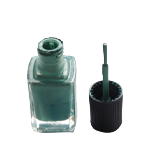 Bathroom
Bathroom
- Aftershaves, perfumes, nail polish and remover, hair care products
- Bathroom cleaners and disinfectants
- Unwanted medicine or those past their use by date
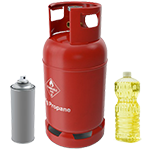 Kitchen
Kitchen
- Cooking oil
- Aerosol cans
- LPG gas cylinders
- Kitchen and bathroom cleaners
- Insect sprays
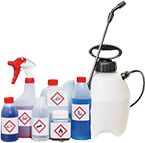 Garden
Garden
- Lawn and plant fertilisers
- Pool cleaning chemicals
- Rodent poisons
- Fungicides, insecticides, herbicides, weed killers and other poisonous liquids
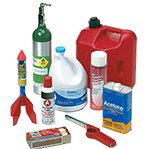 Garage
Garage
- Car batteries
- Antifreeze/coolant, car polish and wax
- Brake fluid, petrol, other used oils
- Paint and paint-related products
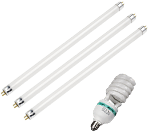 Miscellaneous
Miscellaneous
- E-waste and other unwanted electronics
- Flares
- Asbestos
- Fluorescent tubes and light fittings
- Hot ash from fireplaces or barbeques
How do I handle and store household hazardous waste safely?
- Only buy what you need, do not stockpile household hazardous waste
- Keep the items in their original containers
- If they are leaking, transfer them to new, non-food containers (do not mix chemicals)
- Make sure all labels, including warning labels and manufacturer’s instructions, remain intact on the packaging
- Ensure storage area is cool and dry
- Store them upright with lids tightly secured, out of the reach of children and pets
- Transport to the drop-off locations
How does Cleanaway support hazardous waste disposal?
Cleanaway partners with local councils to collect and dispose of unwanted chemicals at our facilities and through mobile drop off events. Our service includes EPA-compliant transportation, processing, recycling and disposal technologies.
If you are a business, farm or have large volumes of hazardous waste, please contact 13 13 39 to learn more about our hazardous waste disposal services.
More solutions for Hazardous Regulated Waste
Contact us directly on 13 13 39 or fill up one of these short forms. We will get back to you as soon as possible with your request or booking.
We are in every major city and region in Australia. Chances are you will find us not too far away from where you are. We’re in Sydney, Melbourne, Brisbane, Adelaide, and Perth, as well as Karratha, Rockhampton, Newcastle, Geelong, Port Augusta, Albury, and more.
